|
4/18/2022 0 Comments Who I Am. What I Do.**—If I'm doing it right, there's both overlap and freestanding territory. For years and years, I didn't do it right. Facebook, I've noted before, isn't good for much, but it's damn near essential for a few things: easy keeping up with far-flung friends and relatives, recipes, irritating others with your daily Wordle grid, cat memes, birthday greetings (the most heartwarming day of the year, every year), etc. Increasingly, I'm finding value in the stored-up daily memories, especially the things I don't remember writing or don't remember the impetus for writing. Today (April 18) served up this kick to the hippocampus: My newspaper career started in October 1988, when Jim Fuquay gave me a job as a part-time correspondent at the Fort Worth Star-Telegram. It ended in August 2013, when I left my job as night city editor at the Billings Gazette. In between, I worked at nine newspapers in six states. Some jobs I took for the adventure (Peninsula Clarion, Kenai, Alaska, age 21). Some I took for money (Dayton Daily News, 1994). I almost always regretted those, by the way. Some I took for escape (Anchorage Daily News, 1995, to get away from Dayton). Some I took because I knew they'd make me better (San Jose Mercury News, 1998). One I took to correct a mistake (San Jose Mercury News, 2000, after bouncing to both San Antonio and Olympia, Wash., earlier that year). Twice I accepted jobs and then backed out before I was due to report (particular apologies to the Lewiston (Maine) Sun Journal). I took different jobs for different reasons. Sometimes those reasons panned out and sometimes they didn't. But most of the time, what I was really looking for in a new job was some new version of me. I never found that. Not once. It feels good to finally admit this. Let's unpack this, shall we? Elisa and I were talking about this the other day, having reached an age at which there's plenty in the rearview to examine and second-guess and (we hope) plenty of road ahead to consider other pathways: If we had it to do again, would we make different career choices? What might we have done instead? Because those ponderings inevitably run up against the butterfly effect, we ended up in a predictable place: Nope. We're good. But it remains an interesting thought experiment, if only for the clarity you find about the choices you did make. I ran toward print journalism—and stayed there a good long time—because it made good use of my particular talents and because it was, in my narrow sense of the word, a daily adventure. Within the strictures of daily newspaper production—you have to gather the stories and stats and pictures, you have to edit the material, you have to design the pages upon which it all rests—were wide variables in what you dealt with daily. The news was always different. The pages began, every day, as blank canvases. I loved that. What I traded for that was significant, though: Friends in other lines of work made more money, enjoyed greater security and stability, had evenings and weekends free, etc. These are not insignificant things. Who I was and my stance with regard to work, especially in my 20s, are so entirely removed from who I am now that I have to strain to remember that guy. I know that his entire definition of self was wound up in being a journalist, that he went to bed thinking about it and woke up each morning with it on his mind, that he bounced up to the world with that shingle around his neck. I lived to work, and I sought out any chance I had to work extra hours, to get plum assignments, to make myself as close to indispensable as I could (an illusion, of course, but one I willingly bought in those years). It's what I didn't do that taunts me now. I didn't fall in love in those years; how could I, when the aggrandizement of Craig the Journalist was front and center among my priorities? I get at that idea in the Facebook memory above: In all my wandering around, looking for some new version of me, I carried my old self into each new situation (wherever you go, there you are). I didn't learn to play the guitar or take a judo class or write a novel. Until, you know, I wrote a novel. When I was trying to emerge from brokenness and impending divorce in 2014-15, I spent a lot of time with a counselor (highly recommended) and with my nose in reading material aimed at my mental/emotional state (e.g., King Warrior Magician Lover) and my soul (The Rag and Bone Shop of the Heart). I wanted to understand what was happening to me, why it had happened, the parts for which I had responsibility (many) and the parts I had to let go (also many). I also read a lot of shorter pieces, some with resonance and some without. Two that stick out, years after the fact, were written by Mark Manson. I recommend these highly, whatever your situation: Fuck Yes or No: "Since you’re now freeing up so much time and energy from people you’re not that into, and people who are not that into you, you now find yourself perpetually in interactions where people’s intentions are clear and enthusiastic. Sweet!" The Guide to Strong Relationship Boundaries: "People with poor boundaries typically come in two flavors: those who take too much responsibility for the emotions/actions of others and those who expect others to take too much responsibility for their own emotions/actions." I hear what you're saying. Craig, you're saying, this is great, but you're talking about personal relationships now, and you were talking about work, and I'm confused. No, no, I'm still talking about work. This is the point. In the extreme emotional duress of a divorce—a traumatic thing I do not recommend, unless, of course, it's the thing that will skirt an even bigger trauma—and with the help of a well-trained, compassionate human and the collected wisdom of learned thinkers, I began to unlock some problems I'd dragged into every area of my life: my interpersonal relationships and my relationship with work. This hard process of dredging up changed me. Better personal boundaries also meant better work boundaries. I'm no less good at what I do—in fact, I'd argue that I'm much, much better than I've ever been—but no longer am I defined entirely by a magazine spread that I've designed, or a report I've edited, or a chapter I've written. What I do is also who I am, but it's not the entirety of the picture. It was written mostly as a joke, but like any good joke, there's truth inside it. In the sidebar on this blog, I define myself this way: Craig Lancaster is an author, an editor, a publication designer, a layabout, a largely frustrated Dallas Mavericks fan, an eater of breakfast, a dreamer of dreams, a husband, a brother, a son, an uncle. And most of all, a man who values a T-shirt. I can live with that. 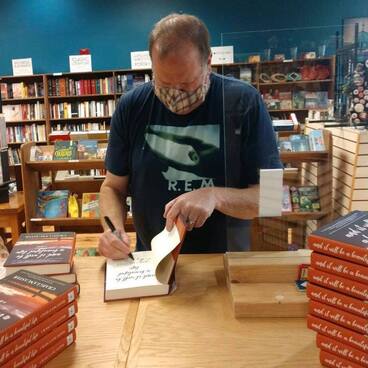 Signing copies at This House of Books in Billings. Signing copies at This House of Books in Billings. In some significant ways, what's happening now in the American workforce—this thing they're calling the Great Resignation—is a manifestation of an assertion of boundaries. We've been through a lot: social tumult, a deadly pandemic, a rebalancing and cross-pollination of work lives and home lives. People are reconsidering what they value, how they want to toil, whom they want to toil for, and what price they're willing to accept for those vast swaths of their finite lives. Good. It's healthy in the long run, even if it's upsetting to the status quo in the shorter term. The last time I moved—packed up my life and my car and my expectations--for a job was more than 20 years ago, when I left Olympia, Wash., to return to San Jose, a place I never should have left in the first place. I can't imagine doing it again, although one of the benefits of growing older is learning that one really shouldn't say never. My point is that although I plan to strap on the work boots for a good long time—I like to work, a fact that was clear even 30 years ago, if badly applied--where I am and who I am and how I'll share those parts of me need more than just a job. I need a multidimensional identity, too, and at last I have one. That's what I was missing in all those moves cited in the Facebook post above. The last time I recast how I define myself professionally occurred when I wrote and published that first book and I figured I could finally call myself a novelist instead of just a guy who wished he had one inside him that he could extract. That was nice, too, but it's not everything. Without the laying about and eating breakfast and doting on my nieces and nephews and being a son and a brother and worrying about the Dallas Mavericks and spinning through this life with my wife, in fact, it wouldn't mean much at all.
0 Comments
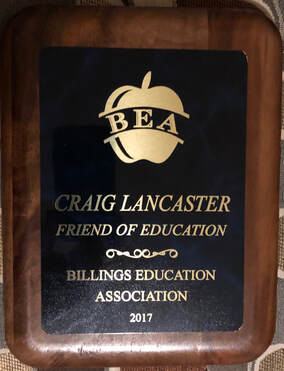 My favorite bauble. My favorite bauble. I've been fortunate enough to have had some terrific honors bestowed upon me. Fifth-grade spelling bee champion. Sixth-grade student council president. I mean, do I have to go on? We're talking biggies here. It was just about this time of year in 2017 that, perhaps, the one that means the most to me came around. The Billings Education Association—the union for public school teachers in the place I call home—honored me as its Friend of Education. It was deeply meaningful to me for several reasons. One, I'm a child of public education (thank you, Birdville Independent School District and Smithfield Elementary, Smithfield Junior High (now middle school) and Richland High School). Two, public school teachers have had a profound effect on me at every stage of life. They've been mentors and influencers and friends. I was born to one. I married one. Three, I truly believe that public education is a compact we must hold with each other, no matter how fraught things get (I'm not terribly optimistic about how things are going in that department, but I still believe in the compact). Public education is the ultimate investment in our future, together. I could go on and on. I have, in fact. Whatever the teachers in my town felt in calling me their friend five years ago, I send it back in triplicate to them. English teachers at West High School here in Billings were instrumental in getting 600 Hours of Edward on the approved curriculum list at the high school level, and for years now, some of them have been teaching it. It blows my mind, still. And the bargain I've made, straight along, is that if you want me to visit the classroom, to talk about writing and creativity and life beyond high school, tell me when and where and I'll be there. The pandemic, as you might imagine, took a bite out of that bargain. And yet, there we were last week, a handful of English classes at West—juniors and seniors—and a creative writing club, and we were working through one of my favorite writing exercises, The Word (I am not its inventor, by the way, just an enthusiastic adopter). Each class, I'd have the kids tell me their name and give me a word. We then ran a random-number generator to choose a single word that the entire class had to use as inspiration for a short story. Writing time: 20 minutes. It's a hell of a thing, I'm sure, to show up one day at school and hear that some dude you've never met before wants you to spend most of a period writing. But these kids did it, and their enthusiasm, generosity, and talent leave me hopeful for their futures and my own. For every period, I wrote alongside them, ending up with nearly 3,000 words of material, by far a busier day than I usually have. I'll spare you the whole passel of short stories (unless you really want to read them), but here's a taste: Lightning When we got the dog—a 48-pound, 40-inch-long, 14-year-old basset hound—I named him Lightning because, among other things, I was into irony. Lightning’s name was Dexter when he was stuffed in a kennel at the humane society, on account of his previous owner, an 84-year-old woman named Mildred, up and died one day and Dexter was found sleeping in the small of the back of her tumbled-over carcass, and Mildred’s kinfolk didn’t want him. And you might say that if a dog has borne a name, any name, for 14 years, he ought to be allowed to keep it for the rest of whatever time he has left. And, OK, that’s a fair point, but Dexter is a crappy name and no more fitting the hound he was than Lightning was. So I changed it. My prerogative. We didn’t get off to a good start, Lightning and me. First night, I put him up on the bed, and he walked around behind my shoulder, I thought he was snuggling in, and he lifted a leg on me. New house, new bed, new people—I guess I can’t blame him, but come on, man. He pooped on the rug the next day—the good rug, that was the problem, not that frayed thing in the den—and I thought, well, Lightning, you ain’t long for us if you don’t straighten up and fly right soon. I needn’t have worried, as it turned out. I’ve come to believe, in the looking back, that the speed of him—opposite the name we’d hung on him—was the secret to his longevity. That dog just wasn’t in a hurry for anything, which kept his heart rate low and his blood moving agreeably. “Lightning, dinner,” we’d say, and we’d wait for the lumbering, this long dog who could have two feet on different sides of a corner, and he’d come into view and he’d eat at a luxurious pace, like a cow working its cud. “Lightning, let’s get in the car!” Same thing. That dog moved in a way that would make a sloth say, “Damn, that’s one slow-moving animal.” Ironic, then, that the event for which he gained his fame around our house, the reason Judy would grip him by those jowls, unbidden, and say, “You’re the best dog ever, yes you are,” was a moment of alacrity. Megan, our youngest, just a baby, crawling for the curb and the traffic beyond, we’re bound up in watching Mitchell show us his batting stance there in the front yard, and she’s nearly to the asphalt, and here’s Lightning, moving at his bah-doop-dee-doo pace and he snags her diaper in his teeth and pulls her back. That’s a good boy. We said goodbye to him last night, the fadeout that we’d seen coming and were still flabbergasted by when it arrived. Lightning, staring up at us, our expectant faces in his, our tears surfacing, and here’s that old floppy-tongued kiss, the one we’d had a thousand times and would never have again, and he’s gone, gone, gone, not so much a flashing discharge of electricity but a shattered star lighting up our days and nights. 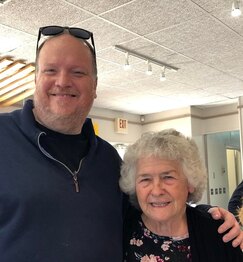 With Hazel Lowrance, my kindergarten teacher (1975-76), in March 2022. With Hazel Lowrance, my kindergarten teacher (1975-76), in March 2022. After writing and sharing—the kids were great about that, too—we talked about what I like so much about this exercise, that in the letters and meaning of a single word, there's a fuse that can be lit and burned down into a burst of creativity. It's one of the most magical things I know of, how you can tap into memory, word association, imagination and pull a story right out of yourself. It's entirely egalitarian. You don't need permission. You don't have to wait for someone to judge you worthy. You just need time and inclination. You need a pencil and a piece of paper and the willingness to get busy. And the thing is, long before I ever thought about these things, long before I ever knew what a writing prompt was, long before I ever imagined trying to build a life around words, I had teachers who pushed me, who had lamplight and were willing to show the way, who truly and honestly believed that each child in their care had purpose and something to offer. On the surface, I don't have much in common with those kids I met last week—I'm older than their parents, in many cases, and from a generation that must seem decrepit and dated to them. And yet, the successors of those teachers I remember with such fondness and admiration are in the classroom now. Still pushing. Still guiding. Still believing. How lucky we are. What a shame it would be if we lost it. 4/7/2022 0 Comments How Do We Feel About Poetry?
Love it! What's the next question?
No, seriously, the great Chris La Tray asks some provocative questions and ponders the meaning of National Poetry Month (which we're now in) in his latest Substack piece. Quoting Chris: This might be the wrong place to ask this question since you glorious subscribers are obviously anything but ignorant philistines in such matters1, but is poetry really an “important place” in the lives of many people? The running joke when it comes to poets is they are the purist practitioners of literature because they obviously aren’t in it for the money. Which sucks when you think about it. So I have to wonder: how many people really engage with poetry on a regular basis? How many people actually buy it? The stuff that goes on around National Poetry Month is worthwhile, I just wish it wasn’t relegated to one month. April rolls around and people get all performative with their love of poetry, share links to poems published online or whatever, but where does it go from there? I encounter many people who tell me, “I don’t get poetry.” That’s fair. I didn’t “get” it for a long time either. When poetry had a bag dropped over its head and was rolled in a carpet and hauled off to the ivory towers to be enjoyed by only a stuffy few the connection to its roots was severed. I contend, though, that there is poetry for everyone. Everyone. I'd like to just endorse all of the above, if I may.
I, too, have heard the "I don't get poetry" bit, and I've probably even said it, although I will say, in my defense, that I was young and inexperienced and kind of ignorant. What I often say, now, when I hear that is, "Well, you listen to music, don't you?" That's poetry, man. And it doesn't have to be Patti Smith or Michael Stipe or Nico—but it should, it should be all of them and many, many, many more. Find the writers and the voices that not only speak to you but also impart something you're not going to find in whatever bubble you live in. Find the words of those who live other lives, have had other experiences, see the world with eyes different than your own. Find something that smacks you in the head with a ratchet. Something that moves you. Once you've got that, everything else is just a matter of form, be it song or sonnet or haiku or slam or whatever.
By inclination and profession, I go to a lot of literary readings, and given a blind choice—go listen to an unidentified poet or an unidentified writer of prose—I'm going to see the poet a hundred times out of a hundred. For the sheer chance of having your doors blown off, of being wowed by the substance and the sonic gelatin that holds it all together, nothing beats a poetry reading. Seriously, listen to Robert Wrigley here and tell me you don't want more. Tell me you don't want all of it.
One of the luckiest things about living where I do is that the place is thick with great poets. Great poets. Just the other day, we attended a reading by Tami Haaland, former Montana poet laureate (and our friend), and Elisa said it was "exactly what my heart, mind, and soul needed today." Yeah. Mine, too.
My brother-in-law, a well-regarded musician and recording engineer, in answer to a question of mine about what makes him sit up and say "holy (very bad word)" when he hears a voice, said this: "The emotion the musician channels." So it is with poetry. That's the beauty. We needn't confine it to a month in spring. We need it every damn day. Go get some at your local indie bookstore. Or use mine. |
About CraigCraig Lancaster is an author, an editor, a publication designer, a layabout, a largely frustrated Dallas Mavericks fan, an eater of breakfast, a dreamer of dreams, a husband, a brother, a son, an uncle. And most of all, a man who values a T-shirt. Archives
July 2024
By categoryAll 600 Hours Of Edward And It Will Be A Beautiful Life Awards Books Bookstores Community Connection Craft Craig Reads The Classics Dreaming Northward Education Edward Adrift Family Geography History Libraries Memory Montana NaNoWriMo Northward Dreams People Plays Poetry Public Policy Q&A Social Media Sports Stage Texas The Fallow Season Of Hugo Hunter The Summer Son This Is What I Want Time Travel Work Writers Writing Archives
July 2024
|
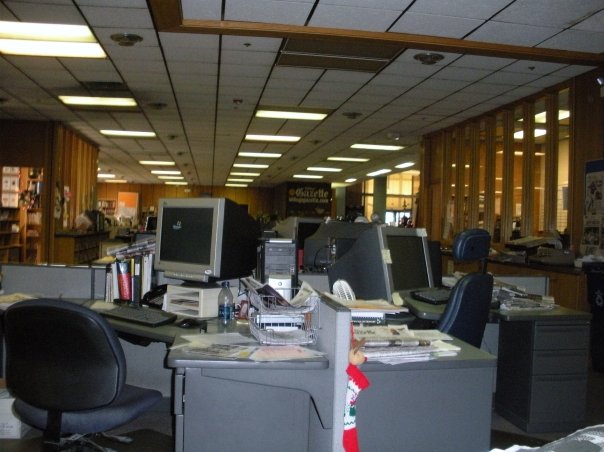
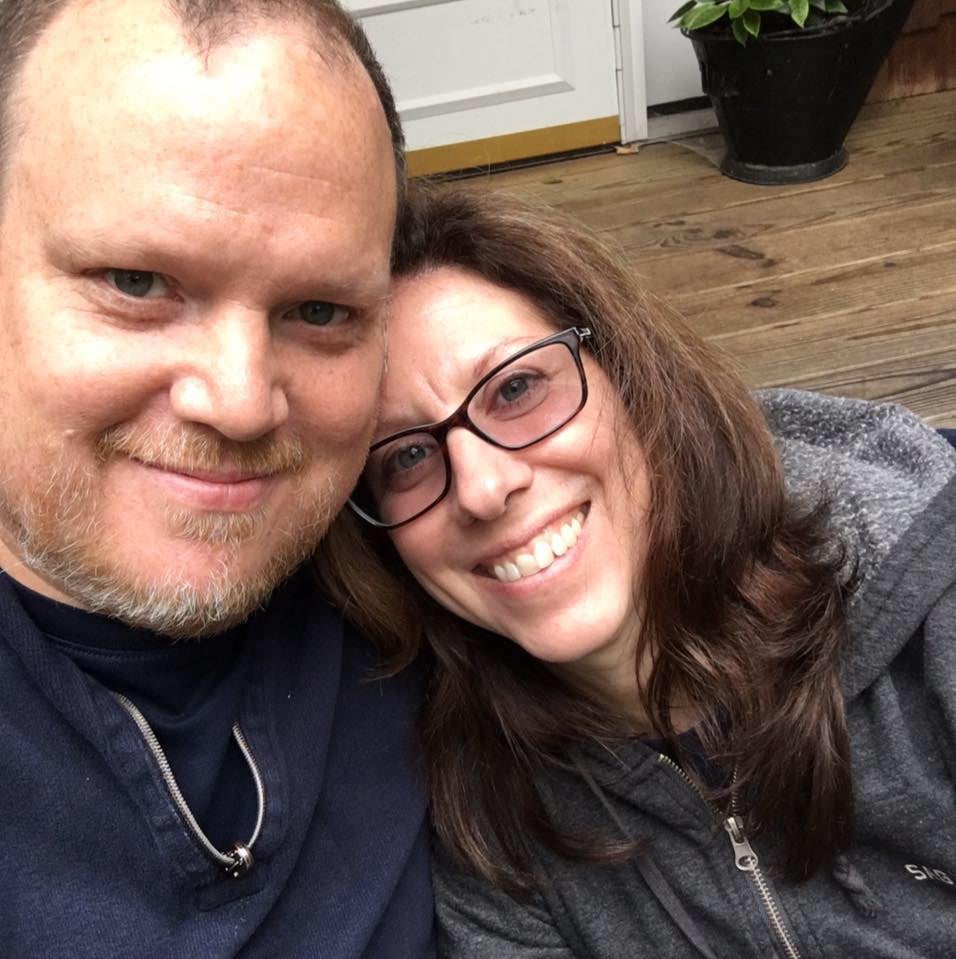
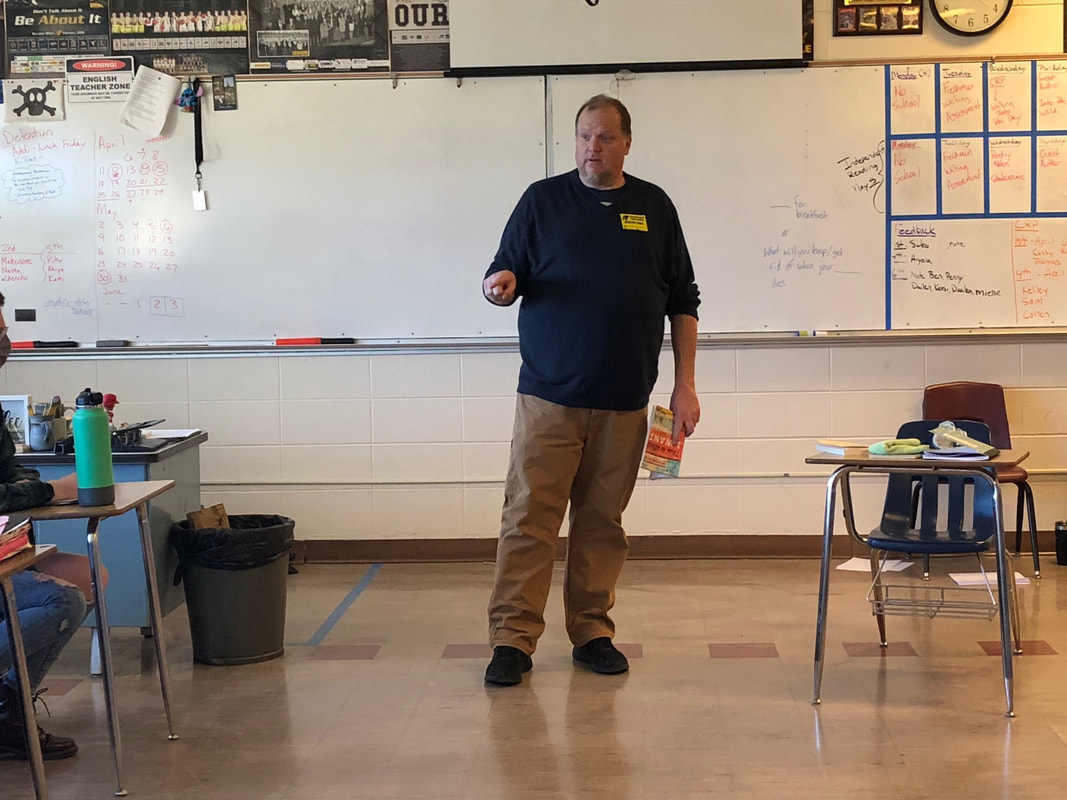
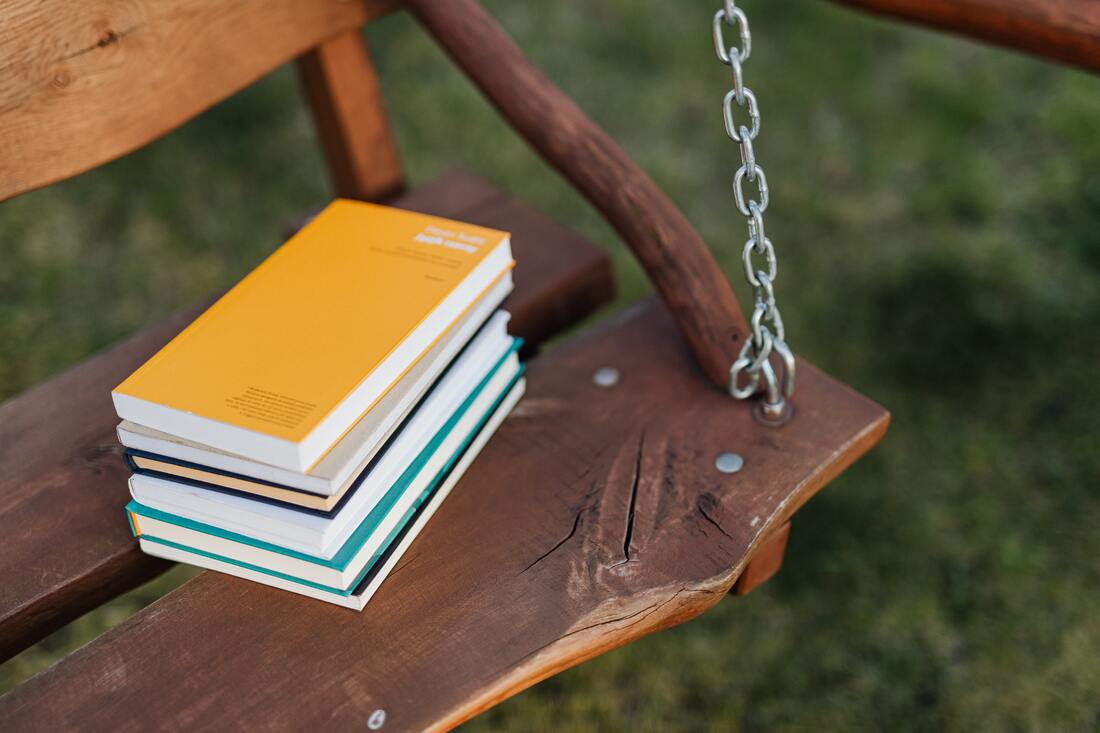
 RSS Feed
RSS Feed